Holy smokes, this review is epic!
Thanks for the in-depth look at the game, Chris. Your enthusiasm and knowledge has me kind of excited to play it, though I feel obligated to actually tackle the first two games before I bother picking this one up.
|
|
See PixlBit's Review Policies

On 01/06/2011 at 09:15 PM by Chris Mabrey Dark Dawn teems with buff and brawn, but is it worth returning the world of Weyard? |

Golden Sun: Dark Dawn is rich in gameplay and lore, packed with style built from the first two games, and although it shines very brightly, the experience is unnecessarily darkened by design regressions. Still, is it worth playing? If you like story centric, character driven RPGs, you bet.
Set thirty years after the events of the second game, The Lost Age, Dark Dawn is the third entry in the Golden Sun universe, and the first to hit the Nintendo DS. Players familiar with Golden Sun titles will feel right at home the moment the game begins, immediately greeted by revamped visuals and the sounds of familiar themes and characters. Don’t worry if you haven’t played either of the preceding Golden Sun titles; the game does a terrific job explaining histories of events and characters without shoving it down your throat.
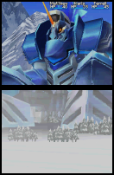
Dark Dawn continues the Golden Sun theme in spades: turn-based RPG gameplay with plenty of environmental puzzles to solve. The game begins with some of the children of the original Golden Sun’s heroes, your starting party of playable characters, learning about crises occurring in their world before being thrust off on their adventure.
Difficulty
Compared to previous Golden Sun titles, Dark Dawn is fairly easy. By simply not running away from many battles and doing some moderate exploration, the only time I was remotely challenged was by the final boss, and that was almost a ridiculous, but manageable, increase in difficulty. The puzzles are also usually straightforward, with only the occasional brow-furrowing moments. If you’re looking for a difficult RPG run, Dark Dawn isn't the one to offer it to you, although there are optional, difficult bosses. However, an easier time through the game isn’t necessarily a bad thing. In fact, for a story-driven game, it’s quite good.
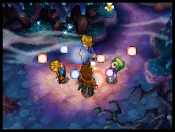
One of the main culprits as to why Dark Dawn felt easier was being able to walk to recover Psynergy (the game’s magic system). This was not present in previous Golden Sun games, and the effect is quite staggering. I literally never ran out of Psynergy during the entire game, even the final boss. Throughout the game all of my characters could just use spells that hit all or almost all of the enemies and fell every enemy in one to two rounds. Dark Dawn also does not have the annoyance of having to rest at an inn to fully recover the stats of a character that’s died. Although these changes made the game a bit easier, they also removed a lot of frustrations and time sinks, keeping the game relatively consistent and keeping the focus on enjoying new battles, places, and puzzles.
What Dark Dawn does is strike a fairly good balance between battles, exploration, and puzzles. I rarely felt annoyed at the rate of random encounters, especially when compared to other random encounter RPGs. The only place I felt haggard with battles was the world map, but world maps always scream "EXPLORE" to me, so anything that gets in my way bothers me, perhaps unjustifiably. As for exploration and puzzles, the game’s creators also, for the most part, followed the wise path of deciding when to focus on puzzles instead of battles. If a room, or even a network of rooms, is devoted to a puzzle, you probably won’t encounter any battles. This is great when you have to backtrack or are trying to figure out how to solve a puzzle through a little trial and error; no longer will you be relentlessly bombarded by enemies while trying to figure out precisely which spot an object should be placed.
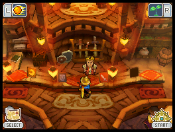
Controls
You can control the game entirely with or without the stylus, allowing you to play in whatever way you find most comfortable. Playing only with the stylus tends to take more time as the interface is largely based on a 1-dimensional sliding bar, but it’s responsive and fun to play around with. I do wish the game supported use of the L and R buttons for progressing battles and conversations (I don’t recall seeing an option for this), but the game does support holding the A button or holding the stylus to the touch screen to progress battles without having to repeatedly mash the A button or tap the touch screen.
Graphics & Presentation
Dark Dawn packs a stellar graphical punch. The characters are by and large fully 3D, and much of the environment is 3D. The camera isn’t controllable, so there’s no rotating it to get other views like in Dragon Quest IX, but there’s no real need for this anyway, so I was fine without having to bother with it. The visuals are generally very nice and thematic throughout the wide array of locales visited. The characters are a little blocky, but nothing too major for a DS title. And special effects abound, with plenty of stunning battle, spell, and summoning effects. More than once the breadth of battle effects surprised me. If you were hoping Dark Dawn would be a pretty game, you won’t be disappointed.
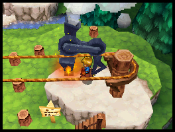
The only nitpick I have with the presentation involves the top screen. There are several times throughout the game that the top screen isn’t displaying anything, so instead the game displays the Golden Sun: Dark Dawn title. This can really damage immersion, especially during exciting high points in the story, and people really don’t need to be reminded about the game they’re playing when there are so many better uses for the top screen. The very nifty four elements symbol that displays on the top screen when a map isn’t being displayed during gameplay could instead be displayed, or even more of the game world or just a black screen. Slapping the title up there seemed strange and was off-putting.
One other curious little feature involves the camera. While walking, if you tell your character to keep walking into, say, a wall, the camera will sometimes keep moving in that direction for a short distance, allowing you to get a sense of what’s ahead. This is occasionally helpful, giving you enough of a glimpse to satisfy a little curiosity, but it can be confusing if the main character is behind something like a building in which the camera implies that you’re moving, but it’s only the camera moving, not you.
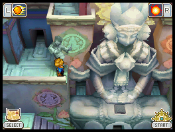
Battle System
The battle system is very similar to the previous Golden Sun games — in fact, I don’t know if there’s any real difference at all. The battles are turn-based, where players can issue commands to attack, defend, use Psynergy, use Djinn (which I’ll describe soon), use items, etc. Much of it is typical RPG fare, but there are aspects that make Golden Sun’s battles unique.
Dark Dawn continues the Golden Sun tradition of having weapons with the possibility of unleashing a special ability on each attack. The more a weapon is used, the more a character becomes proficient with that weapon until the weapon is mastered. These special weapon attacks range from area of effect damage to high single-enemy damage to status effects, adding new incentive to attack and moderate what weapons the party has equipped.
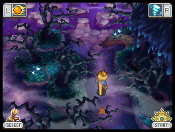
As far as Psynergy goes, there’s no real difference compared to other spell systems: pick a spell, cast it, and it drains PP (Psynergy Points). There are still a wide variety of spells, from varying elemental attacks, healing spells, buffs, and debuffs.
And of course, the Djinn system is in full swing. Djinn can be assigned to characters, and based on the combinations of the elements will change the classes of characters, resulting in altered stats and different available spells. Djinn can also be used in battle for special abilities, which summon powerful creatures. Since Djinn do affect a character’s class, using them in battle may cause their class to change during battle, thus changing the stats and spells a character can cast, particularly the ability to heal. This adds elements of strategy to the game, causing you to be conscious about your Djinn usage, but the game is rarely difficult enough to force you to consider whether or not to use a Djinni beyond what ability it would unleash if you use it in battle.
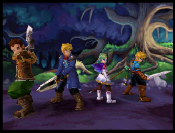
Strategically using and assigning Djinn during battle to generate spell sets for characters could have added several layers to combat, but the game unfortunately does not take full advantage of this system. For the most part, characters always have some useful spells in their arsenal, and battles are rarely difficult enough to require planning which Djinn should be used to ensure characters have particular spells. Many difficult bosses, especially the optional bosses from what I can tell, have the ability to set all Djinn on a character, and maybe even the whole party, into standby mode, causing character class changes. I think the Djinn system could have been utilized further as a strategic asset, but there was never really a need.
One feature I really like is the aforementioned ability to fast-forward battles. This not only keeps the text scrolling, but also makes the battle actually flow faster, a huge plus if you want to just zip through a familiar encounter. The battle doesn’t speed up too terribly much, but it’s noticeable.
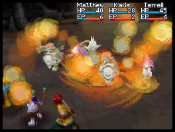
Exploration: Psynergy & Puzzles
Golden Sun’s other huge game mechanic is the environmental, Psynergy based puzzles. Psynergy is not just an asset for battle; it can be used pretty much everywhere in a variety of ways, from moving objects, burning obstacles, growing new pathways, etc. This is by far one of the areas that Dark Dawn improves the most.
Using Psynergy in the game no longer requires a lot of precision, which was often frustrating in the previous titles. When using Psynergy, a circle expands from where the character’s standing, indicating that Psynergy’s range. Anything that falls within that circle that the Psynergy can act upon can be automatically selected with the L and R buttons or manually selected with the stylus, in which you can specify the direction to move an object, fire a Psynergy spell, or simply select the location to use the Psynergy. It’s quicker, easier, and more intuitive. The only time the character should be aligned in a particular way is if you want to hit multiple targets at once with the Psynergy, but this doesn’t happen often.
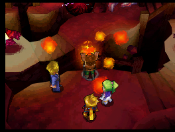
Puzzles occur frequently, but as I stated before, they’re usually straightforward and won’t challenge you too much, but they’re just enough fun to make dungeons exciting and secrets rewarding.
Story Presentation (Spoiler-Free) & Dialog
During the opening sequences, the developers set up a solid foundation for the story. Primarily, it progresses through a combination of lore and dialog. Although Dark Dawn requires reading (even the back of the game case says basic reading ability is required to enjoy the game), it caters to both light and voracious readers by the inclusion of a dictionary system. The dictionary contains explanations of key terms, events, and characters that are important to the story, including historical details. Entries come up as selectable text during normal conversation with new or updated terms being red and underlined and previously read terms darkened.
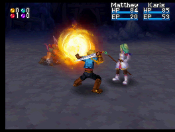
This is tremendously helpful for players who have never played the first two Golden Sun titles and for players wanting to learn more specifically about Dark Dawn. These dictionary entries rarely feel like required reading as the story’s normal dialog details information well, but they are enlightening and entertaining when you want to read them.
The game also has several books you can find that goes through the events of the first two titles in short, well-done cutscenes.
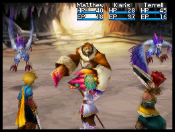
The game also does a good job reminding you of what you should be doing next. This was a really nice feature for coming back to the game after putting it down for a while; the save screen details your current objectives. Although a couple of times the reminder was a little vague or not quite up-to-date, forcing me to run around until I found the right place to be. The game also reminds you of actions you can take in menus if you idle for too long without being very obtrusive, which is great for really novice users.
The dialog system is similar to the previous Golden Sun entries, with plenty of charm and humor. (And, yes, the chatting noises characters make when they speak are alive and well, which you can turn off, if you prefer.) Characters are more expressive this time around with the ability to display various emotions through pop-up facial expressions (like a happy face, sad face, angry face, etc.) which helped me understand character’s feelings more than I expected them to. These expressions were also used appropriately, and not overused, for the most part. Some conversations are a little long-winded, but nothing too bad; times when the entire party would be discussing something were usually entertaining. And of course, there are plenty of NPCs with something to share in Dark Dawn, which I really enjoyed, as I like lively towns.
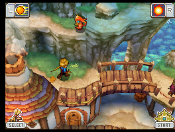
A major inclusion to the dialog system is the ability for the main character to express his feelings in response to conversations at set points. Usually, a character will ask the main character how he feels about something, and the player gets to respond with a happy face, a super happy face, a sad face, or an angry face. This adds interactivity to the conversations, but the choices you make as the player never seem to make any difference to the game other than how characters respond. It spices things up, but it doesn’t seem to offer any additional control over the game. The primary problem I actually had with this system was with uncertainty. More than half the time I wasn’t sure what part of the conversation I was responding to, selecting a happy face to imply what I thought would mean “Such and such will be OK!” would be interpreted by other characters as “How can you be OK with such and such’s situation?,” for example. It was a little confusing.
This is a really small detail, but one change from previous Golden Sun titles is that each NPC only has one thing to say, whereas before I think they would have two things to say at a given time, not counting mind reading abilities. I personally like this as it eases my obsession to talk to each person more than once, but this may be a negative for some players.
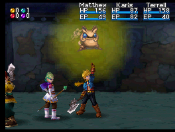
How do all of these elements feel in regard to pacing? The earlier parts of the game felt a little slow: some talking, some towns, some dungeons, but nothing really notable. Then things get dicier as the story progresses, particularly in character interaction and how situations are approached, with some timely twists and turns along the way. The beginning of the game could have used more variety in its objective-to-town-to-dungeon-to-new-objective formula. Mixing this up later in the game made exploring the game’s assets more enjoyable, casting less light on small drudgeries.
My biggest problem with the game overall is that of the story itself. This will remain spoiler-free, but I do want to talk about the state in which the game ends as I think it illustrates the problem well. The story sets itself up as a great presentation of previous Golden Sun events and the current state of Weyard, the world the game takes place in, but by the time the game ends, I felt like the real, current events of the story, the things that really matter, are only just about to take place.
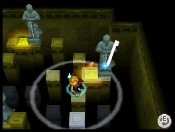
The questions posed towards the beginning of the story, even the reason the main characters start their quest in the first place, aren’t really answered. In fact, most of the events of the story are in response to events that are really only set into motion once the characters start their journey. Although the story is engrossing, much of the answers to the questions the story begins with are only given in small quantities, and although the ending reveals a little more information, clearly much of the world’s mysteries are being held for a sequel. This is so similar to the first Golden Sun title that it’s almost a letdown — even with the final boss. If anything, Dark Dawn sets up a great launching pad for what is to come, with an exciting story in and of itself, but some of the most intriguing questions posed at the beginning of the story go largely unanswered.
Post-Game Content & Replayability
The game does have optional dungeons and bosses, some of which are only available after you beat the game, but there’s not too many. If you play the game without running from too many battles, it won’t take long to reach a comfortable level to defeat the optional bosses. So, yes, additional content is there, but not a tremendous amount.
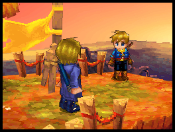
As for replay value, there’s not really much aside from seeing how the dialog plays out differently based on how you react, which doesn’t alter the game. The only compelling reason to replay the game would be for Djinni and equipment collection, but this is only because of the game’s several points of no return where that one Djinni you thought you could go back and get later is now permanently out of your grasp.
So, PixlBit! Is this game fun?
Golden Sun: Dark Dawn is a great game with fun battles, plenty of puzzles, and an engaging story well worth experiencing, but don’t expect a difficult journey or a consistent amount of exploration. More than once Dark Dawn will tease you with information or new avenues to pursue, but much of them are being saved for what has the potential to be a great sequel.
Comments